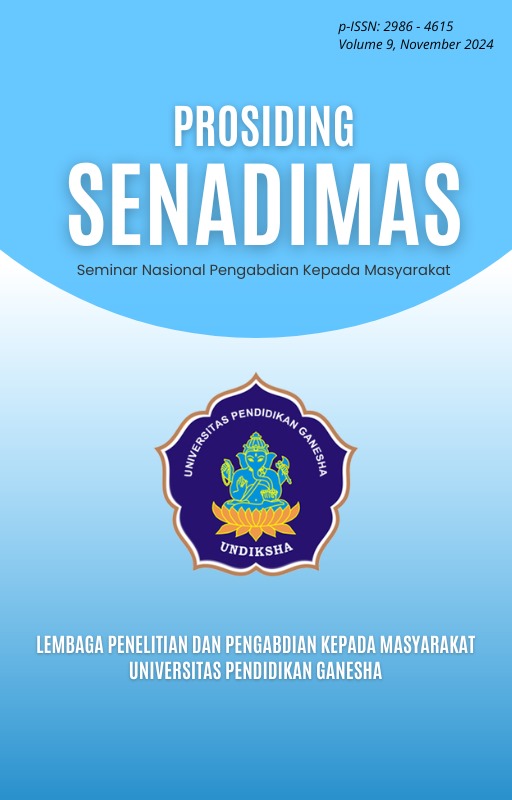PENYUSUNAN PERANGKAT PEMBELAJARAN BERBANTUAN ARTIFICIAL INTELLIGENCE BAGI PARA GURU DI SINGARAJA
Kata Kunci:
artificial_intelligence, pembelajaran_berbantuan_teknologi, hasil_belajarAbstrak
Teknologi digital yang lagi gencar berkembang saat ini adalah pemanfaatan artificial intelligence dalam kehidupan, termasuk dalam bidang pendidikan yang mampu meringankan pekerjaan manusia. Namun, pemanfaatan artificial intelligence dalam pelaksanaan pembelajaran khususnya, belum dipahami dengan baik oleh para pendidik, baik dari aspek perencanaan, pelaksanan, maupun evaluasinya. Permasalahan ini juga terjadi di sekolah mitra PkM ini, yaitu SMP Negeri 4 Singaraja, SMP Lab. Singaraja, dan SDN 1 Baktiseraga. Tujuan pelaksanaan PkM ini adalah sebagai berikut. (a) Meningkatkan pengetahuan dan keterampilan guru dalam merancang dan melaksanakan pembelajaran berbantuan artificial intelligence. (b) Menghasilkan buku pedoman yang valid untuk pembelajaran berbantuan artificial intelligence. Metode dan tahap-tahap pelaksanaan program dalam pencapaian tujuan meliputi empat langkah pokok, yaitu: (1) menemukan masalah, (2) menemu kenali potensi, (3) menganalisis masalah dan potensi, dan (4) memilih solusi pemecahan masalah. Data yang diperoleh dikumpulkan menggunakan angket. Analsis data dilakukan secara deskriptif dan kualitatif. Hasil pelaksanaan kegiatan PkM ini adalah Kemampuan guru membuat modul ajar berbantuan artificial intelligence berkualifikasi “baik”. Kemampuan guru melalui pelaksanaan pembelajaran berbantuan artificial intelligence berkualifikasi “baik” dan dan hasil belajar siswa di semua sekolah sudah melampaui batas KKM (70). Buku pedoman pembelajaran berbantuan artificial intelligence yang dihasilkan memenuhi kriteria “valid”.
Referensi
Alnasib, B. N. M. (2023). Digital Competencies: Are Pre-Service Teachers Qualified for Digital Education? International Journal of Education in Mathematics, Science and Technology. https://doi.org/10.46328/ijemst.2842
Amin, A. K., Degeng, N. S., Setyosari, P., & Djatmika, E. T. (2021). The Effectiveness of Mobile Blended Problem Based Learning on Mathematical Problem Solving. International Journal of Interactive Mobile Technologies. https://doi.org/10.3991/IJIM.V15I01.17437
Atwood, S. A., & Singh, A. (2018). Improved pedagogy enabled by assessment using gradescope. ASEE Annual Conference and Exposition, Conference Proceedings. https://doi.org/10.18260/1-2--30627
Chiu, T. K. F., Xia, Q., Zhou, X., Chai, C. S., & Cheng, M. (2023). Systematic literature review on opportunities, challenges, and future research recommendations of artificial intelligence in education. In Computers and Education: Artificial Intelligence. https://doi.org/10.1016/j.caeai.2022.100118
Dror Ben-Naim, & University of New South Wales in Sydney. (2023). Smart Sparrow. Smart Sparrow.
Foster, M. E. (2024). Evaluating the Impact of Supplemental Computer-Assisted Math Instruction in Elementary School: A Conceptual Replication. Journal of Research on Educational Effectiveness. https://doi.org/10.1080/19345747.2023.2174919
Gede Arka Puniatmaja, Ni Nyoman Parwati, I Made Tegeh, I. G. W. S. (2024). The Effect of E-learning and Students’ Digital Literacy towards Their Learning Outcomes. Pegem Journal of Education and Instruction, 14(1), 348–356. https://doi.org/https://doi.org/10.47750/pegegog.14.01.39
Halaweh, M. (2023). ChatGPT in education: Strategies for responsible implementation. Contemporary Educational Technology. https://doi.org/10.30935/cedtech/13036
Hwang, G. J., Xie, H., Wah, B. W., & Gašević, D. (2020). Vision, challenges, roles and research issues of Artificial Intelligence in Education. In Computers and Education: Artificial Intelligence. https://doi.org/10.1016/j.caeai.2020.100001
Kaban, A. (2023). Artificial Intelligence in Education: A Science Mapping Approach. International Journal of Education in Mathematics, Science and Technology. https://doi.org/10.46328/ijemst.3368
Nyoman Parwati, N., Gusti Putu Suharta, I., & G. W. S. (2023). TPACK Theoretical Correspondence with Learning Variables and Its Application Effectiveness in Learning. Journal of Pedagogy and Education Science (JPES), 2(03), 243–255. https://doi.org/10.56741/jpes.v2i03.402
Nyoman Parwati, N., Gusti Putu Suharta, I., & Gde Wawan Sudatha Corresponding Author, I. (2023). TPACK Theoretical Correspondence with Learning Variables and Its Application Effectiveness in Learning Article history. Journal of Pedagogy and Education Science (JPES), 2(03), 243–255. https://doi.org/10.56741/jpes.v2i03.402
Ouyang, F., & Jiao, P. (2021). Artificial intelligence in education: The three paradigms. Computers and Education: Artificial Intelligence. https://doi.org/10.1016/j.caeai.2021.100020
Parwati., N. N., & Suharta, I Gusti Putu., Gede Doddy Tisna, M.S., S.Or., M. O. (2022). PELAKSANAAN PEMBELAJARAN DARING INTERAKTIF BERBANTUAN APLIKASI EDPUZZLE DI SDN 1 BAKTISERAGA. In M. K. Jude Baskara (Ed.), Proceeding Senadimas Undiksha 2022 (pp. 242–254). https://lppm.undiksha.ac.id/senadimas/2022/prosiding/
Parwati, N. N., Suharta, I. G. P., & Sudatha, I Gde Wawan, I. G. A. A. (2023). MEDIA PEMBELAJARAN INTERAKTIF-LABORATORIUM VIRTUAL UNTUK MENINGKATKAN PEMAHAMAN KONSEP DAN KARAKTER POSITIF SISWA. In M. . Gede Arna Jude Saskara, S.T. (Ed.), Proceeding Senadimas Undiksha 2023 (pp. 854–860). Undiksha Press. https://lppm.undiksha.ac.id/prosiding-senadimas/
Resien, R., Sitompul, H., & Situmorang, J. (2020). The Effect of Blended Learning Strategy and Creative Thinking of Students on the Results of Learning Information and Communication Technology by Controlling Initial Knowledge. In Budapest International Research and Critics in Linguistics and Education (BirLE) Journal (Vol. 3, Issue 2, pp. 879–893). pdfs.semanticscholar.org. https://doi.org/10.33258/birle.v3i2.997
Rios-Campos, C., Cánova, E. S. M., Zaquinaula, I. R. A., Zaquinaula, H. E. A., Vargas, D. J. C., Peña, W. S., Idrogo, C. E. T., & Arteaga, R. M. Y. (2023). Artificial Intelligence and Education. South Florida Journal of Development. https://doi.org/10.46932/sfjdv4n2-001
Rusillo-Magdaleno, A., Ruiz-Ariza, A., Suárez-Manzano, S., & Martínez-Redecillas, T. (2023). Artificial Intelligence, Augmented Reality and Education. In Springer Series on Cultural Computing. https://doi.org/10.1007/978-3-031-27166-3_6
Sanusi, I. T., Olaleye, S. A., Agbo, F. J., & Chiu, T. K. F. (2022). The role of learners’ competencies in artificial intelligence education. Computers and Education: Artificial Intelligence. https://doi.org/10.1016/j.caeai.2022.100098
Suharta, I Gusti Putu., Ni Nyoman Parwati., M. J., & Sudarma, I. K. (2020). PENGEMBANGAN RENCANA DAN PELAKSANAAN PEMBELAJARAN YANG BERMUARA PADA PENGUATAN KARAKTER POSITIF. In M. S. Putu Indra Christiawan, S.Pd. (Ed.), Proceeding Senadimas Undiksha 2020 (pp. 206–210). Undiksha Press. https://lppm.undiksha.ac.id/prosiding-senadimas/
Suharta, I Gusti Putu., Parwati, Ni Nyoman., Sudatha, I. G. W. (2023). PELATIHAN DAN PENDAMPINGAN PENGEMBANGAN MEDIA PEMBELAJARAN INTERAKTIF BERBASIS KARAKTER BAGI GURU-GURU SDN 1 BAKTISERAGA. In M. . Gede Arna Jude Saskara, S.T. (Ed.), Proceeding Senadimas Undiksha 2023 (pp. 861–869). Undiksha Press. https://lppm.undiksha.ac.id/prosiding-senadimas/
Tan, X. (2023). The Impact of ChatGPT on Education and Future Prospects. Highlights in Science, Engineering and Technology. https://doi.org/10.54097/hset.v61i.10285
Unduhan
Diterbitkan
Terbitan
Bagian
Lisensi
Hak Cipta (c) 2024 Seminar Nasional Pengabdian kepada Masyarakat

Artikel ini berlisensiCreative Commons Attribution-ShareAlike 4.0 International License.



